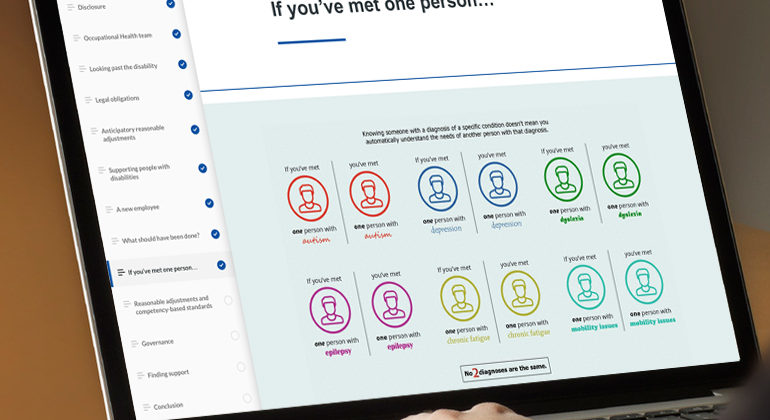Disability Awareness HR Responsibilities
16th July 2019

7.6 million people in the UK of working age reported that they had a disability between January-March 2019, which is 18% of the working-age population. Having a good awareness and understanding of how the workplace can affect disabled people and having the appropriate policies and procedures not only help ensure compliance but can deliver significant benefits to businesses. The following sets out some brief guidance on employing disabled people.
Make sure you’re compliant with all current legislation involving disabilities. The Equality and Human Rights Commission and the Equality Act are excellent starting points though remember there may be additional legislation affecting your staff and colleagues. All managers need to know their responsibilities if they are to play a meaningful role and all guidance should be accessible by staff.
Remember that laws can change so make sure you keep abreast of all rules and regulations that affect your staff and business.
Audit your policies and procedures. Carrying out regular equality assessments will help identify any policies, practices and processes that inadvertently disadvantage disabled people. The Statutory Employment Code of Practice is helpful. This should include an audit of employee diversity.
Ensure your facilities are fit for purpose. The Employment Statutory Code of Practice clearly states that employers must take reasonable steps to implement reasonable adjustments to the workplace and working arrangements for both staff and job applicants. This is highly contextual and wide-ranging and could include the provision of additional services or facilities, assigning employees to a different location of work, altering work hours or training the disabled person to use special equipment.
Develop Personal Emergency Evacuation Plans (PEEPS). HR or management need to ensure that specific arrangements are in place to manage the safe egress of individual staff or building users who cannot get themselves out of the building or premises unaided, in the case of an emergency.
Provide an Occupational Health (OH) service for employees. This could include Access to Work and other health and safety-related initiatives.
Provide an Employee Assistance Program. This could include counselling and guidance services, either on-site or remote access.
Send a clear message. It is vital that inclusivity, diversity and the promotion of equal opportunities are integral to your workplace culture. Senior management should take the lead and promote this ethos at all times. Anyone failing to promote a culture of fairness and inclusion should be managed appropriately, as soon as possible. Find out more about e-learning training for diversity in the workplace.
Provide diversity and inclusion training for all staff. All employees should be trained on disability awareness to help dispell misconceptions, confront unconscious bias and ensure they are sensitive towards their colleague’s needs. Training is one of the most popular, accessible and successful methods for promoting workplace equality. Find out more about e-learning for disability awareness.
Offer disability awareness training. This should be offered to all employees and should cover all interactions with disabled people and their needs. It could include a variety of themes such as how to communicate with people who have a hearing impairment, awareness of the impact of mental health conditions and accessibility issues. The training should be as interactive as possible to demonstrate impacts and encourage people to share their experiences especially disabled people.
Promote an inclusive and deliver recruitment process. This means taking account of equality and diversity in recruitment. Always make sure you use inclusive language and images in advertisements, job descriptions and application forms. During the interview process, all candidates must be allocated the same amount of time, asked the same questions and informed beforehand about any tests they have to take. Interviewers must focus on the candidate’s experience and abilities that relate to the person specification and select the person who best meets the essential criteria.
Candidates who have disabilities are not obliged to make a disclosure of any disability until a job offer is made. However, HR should encourage applicants to disclose their disability as early as possible so the organisation can implement any support that may be needed for them to avoid any disadvantage or potential discrimination.
Making it work
Many people don’t tell their employer that they have a disability for fear of being treated differently, disadvantaged or discriminated against. By ensuring your business has the appropriate policies and procedures, that your staff are educated and that your working culture is fair and inclusive it can all help to include and benefit everyone.
Contact us today to find out how our disability awareness e-learning course could help your staff and business – email Jo Dale at jdale@marshallacm.co.uk or call 0203 735 8681


